Event Planning and Management Report: Ideology's Impact on Events
VerifiedAdded on 2023/06/09
|6
|1180
|251
Report
AI Summary
This report delves into the multifaceted relationship between event planning and management and the underlying influence of ideology. It begins by introducing the concept of ideology and its historical evolution, highlighting key themes such as the origination of ideology and its development through different stages, including the contributions of thinkers like Plato, Marx, and Weber. The report then connects these ideological frameworks to the context of event management, illustrating how events serve as platforms for disseminating information and shaping social perceptions. Examples, such as the evolution of Christmas and the rise of Nazism, are used to demonstrate how ideologies can manifest within events. Furthermore, the report examines the lessons learned regarding the role of stakeholders and decision-making processes in modern event management, drawing upon concepts like Antonio Gramsci's 'hegemony'. Ultimately, the report concludes that ideology is a critical mechanism for shaping cultural consensus and influencing the identity of events.

Running head: Event Planning and management
Event Planning and management
Event Planning and management
Paraphrase This Document
Need a fresh take? Get an instant paraphrase of this document with our AI Paraphraser
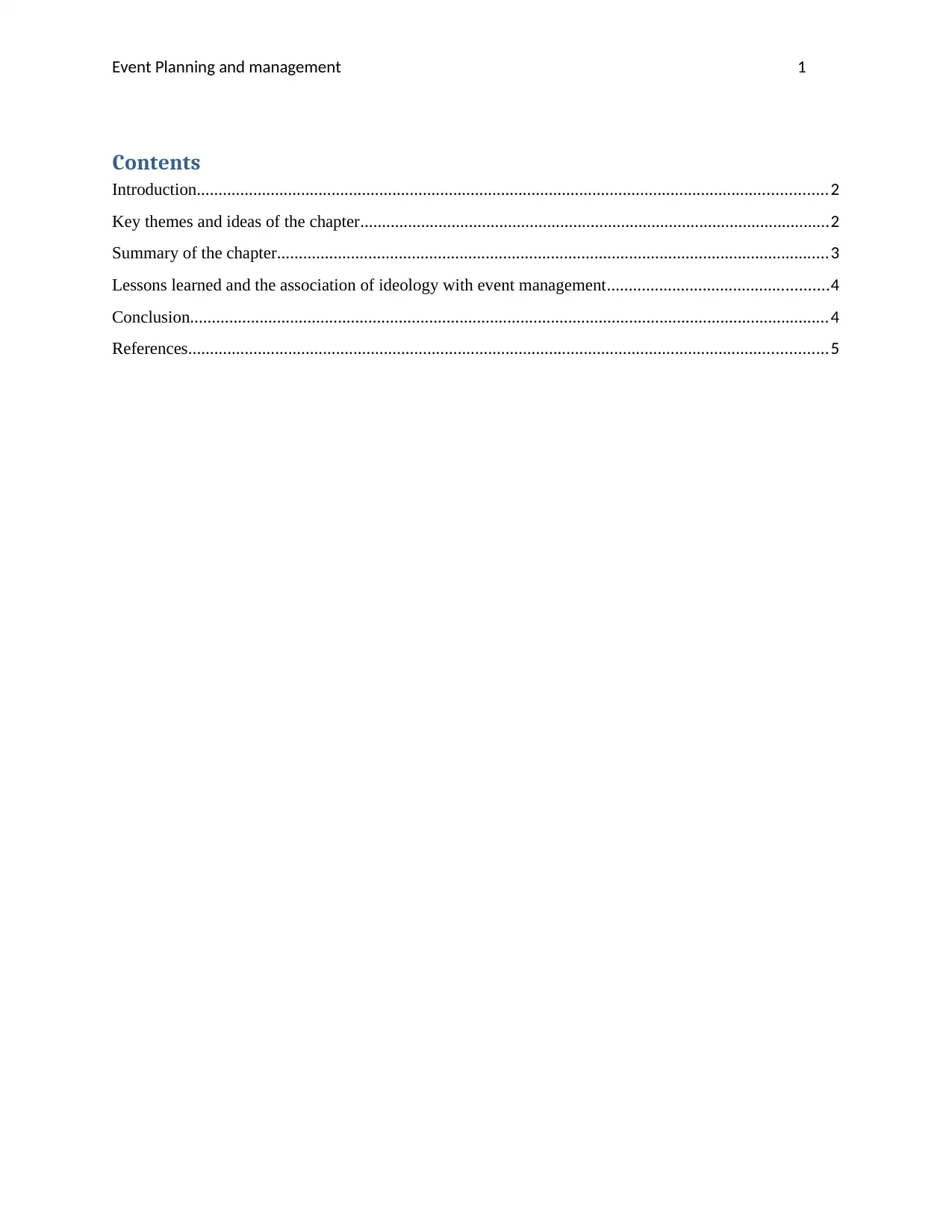
Event Planning and management 1
Contents
Introduction.................................................................................................................................................2
Key themes and ideas of the chapter............................................................................................................2
Summary of the chapter...............................................................................................................................3
Lessons learned and the association of ideology with event management...................................................4
Conclusion...................................................................................................................................................4
References...................................................................................................................................................5
Contents
Introduction.................................................................................................................................................2
Key themes and ideas of the chapter............................................................................................................2
Summary of the chapter...............................................................................................................................3
Lessons learned and the association of ideology with event management...................................................4
Conclusion...................................................................................................................................................4
References...................................................................................................................................................5
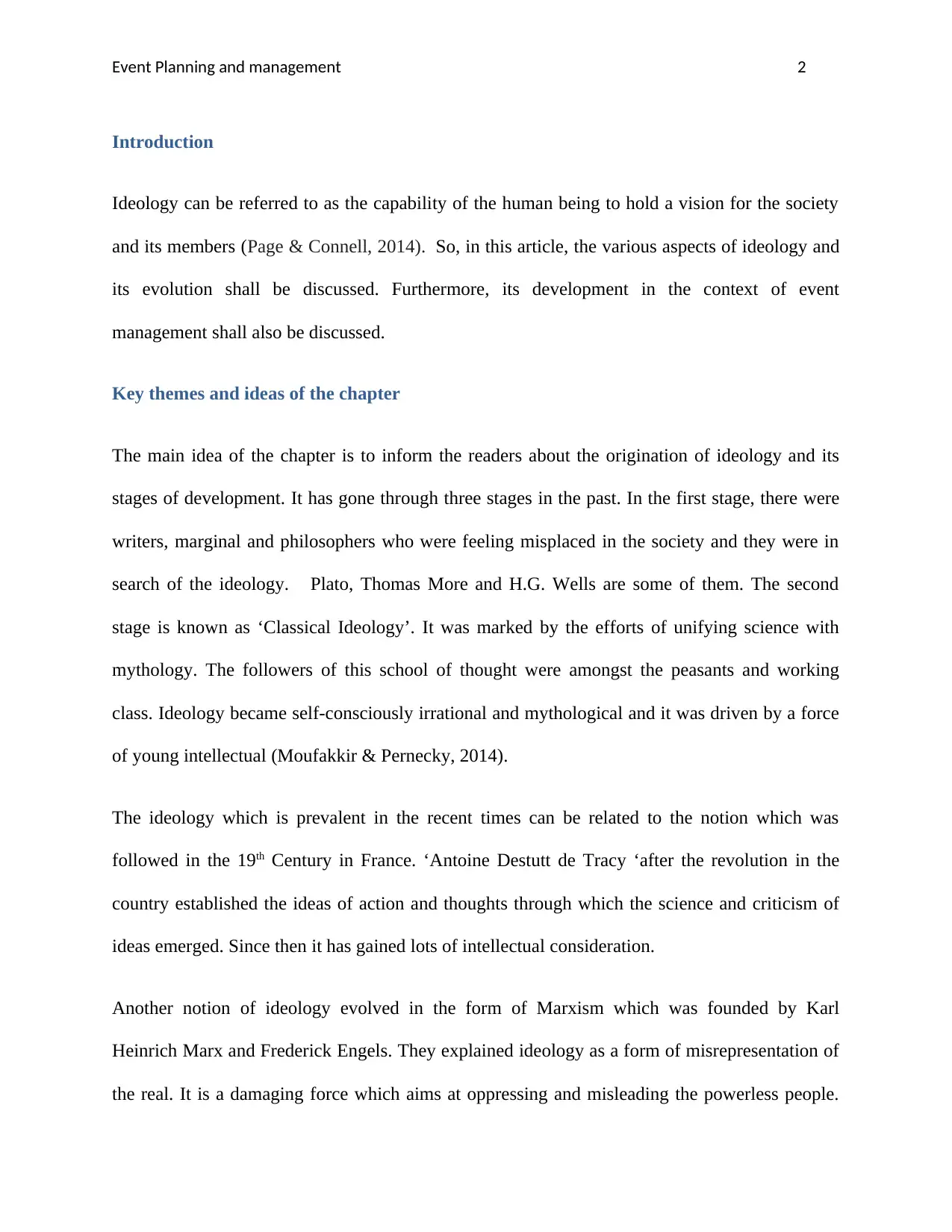
Event Planning and management 2
Introduction
Ideology can be referred to as the capability of the human being to hold a vision for the society
and its members (Page & Connell, 2014). So, in this article, the various aspects of ideology and
its evolution shall be discussed. Furthermore, its development in the context of event
management shall also be discussed.
Key themes and ideas of the chapter
The main idea of the chapter is to inform the readers about the origination of ideology and its
stages of development. It has gone through three stages in the past. In the first stage, there were
writers, marginal and philosophers who were feeling misplaced in the society and they were in
search of the ideology. Plato, Thomas More and H.G. Wells are some of them. The second
stage is known as ‘Classical Ideology’. It was marked by the efforts of unifying science with
mythology. The followers of this school of thought were amongst the peasants and working
class. Ideology became self-consciously irrational and mythological and it was driven by a force
of young intellectual (Moufakkir & Pernecky, 2014).
The ideology which is prevalent in the recent times can be related to the notion which was
followed in the 19th Century in France. ‘Antoine Destutt de Tracy ‘after the revolution in the
country established the ideas of action and thoughts through which the science and criticism of
ideas emerged. Since then it has gained lots of intellectual consideration.
Another notion of ideology evolved in the form of Marxism which was founded by Karl
Heinrich Marx and Frederick Engels. They explained ideology as a form of misrepresentation of
the real. It is a damaging force which aims at oppressing and misleading the powerless people.
Introduction
Ideology can be referred to as the capability of the human being to hold a vision for the society
and its members (Page & Connell, 2014). So, in this article, the various aspects of ideology and
its evolution shall be discussed. Furthermore, its development in the context of event
management shall also be discussed.
Key themes and ideas of the chapter
The main idea of the chapter is to inform the readers about the origination of ideology and its
stages of development. It has gone through three stages in the past. In the first stage, there were
writers, marginal and philosophers who were feeling misplaced in the society and they were in
search of the ideology. Plato, Thomas More and H.G. Wells are some of them. The second
stage is known as ‘Classical Ideology’. It was marked by the efforts of unifying science with
mythology. The followers of this school of thought were amongst the peasants and working
class. Ideology became self-consciously irrational and mythological and it was driven by a force
of young intellectual (Moufakkir & Pernecky, 2014).
The ideology which is prevalent in the recent times can be related to the notion which was
followed in the 19th Century in France. ‘Antoine Destutt de Tracy ‘after the revolution in the
country established the ideas of action and thoughts through which the science and criticism of
ideas emerged. Since then it has gained lots of intellectual consideration.
Another notion of ideology evolved in the form of Marxism which was founded by Karl
Heinrich Marx and Frederick Engels. They explained ideology as a form of misrepresentation of
the real. It is a damaging force which aims at oppressing and misleading the powerless people.
⊘ This is a preview!⊘
Do you want full access?
Subscribe today to unlock all pages.

Trusted by 1+ million students worldwide
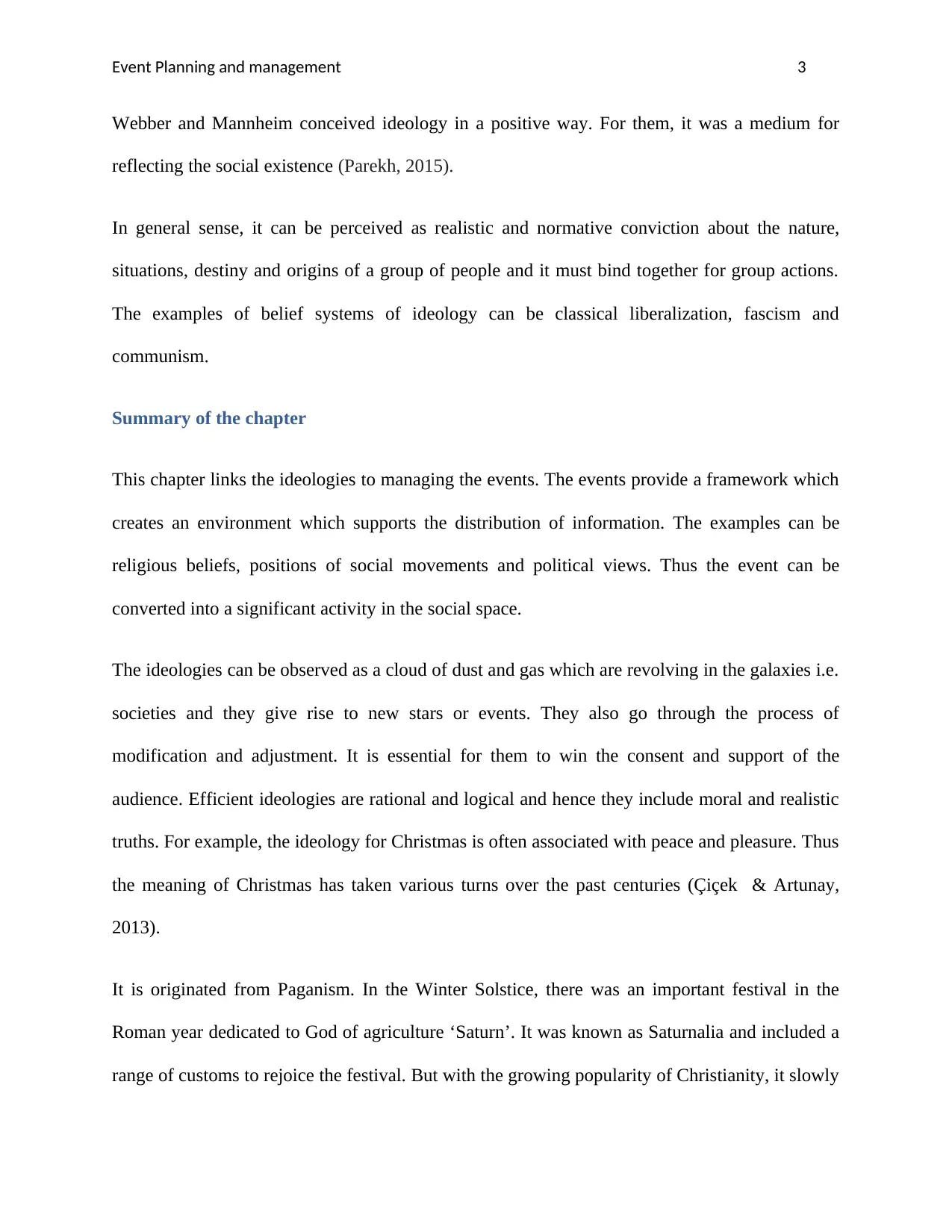
Event Planning and management 3
Webber and Mannheim conceived ideology in a positive way. For them, it was a medium for
reflecting the social existence (Parekh, 2015).
In general sense, it can be perceived as realistic and normative conviction about the nature,
situations, destiny and origins of a group of people and it must bind together for group actions.
The examples of belief systems of ideology can be classical liberalization, fascism and
communism.
Summary of the chapter
This chapter links the ideologies to managing the events. The events provide a framework which
creates an environment which supports the distribution of information. The examples can be
religious beliefs, positions of social movements and political views. Thus the event can be
converted into a significant activity in the social space.
The ideologies can be observed as a cloud of dust and gas which are revolving in the galaxies i.e.
societies and they give rise to new stars or events. They also go through the process of
modification and adjustment. It is essential for them to win the consent and support of the
audience. Efficient ideologies are rational and logical and hence they include moral and realistic
truths. For example, the ideology for Christmas is often associated with peace and pleasure. Thus
the meaning of Christmas has taken various turns over the past centuries (Çiçek & Artunay,
2013).
It is originated from Paganism. In the Winter Solstice, there was an important festival in the
Roman year dedicated to God of agriculture ‘Saturn’. It was known as Saturnalia and included a
range of customs to rejoice the festival. But with the growing popularity of Christianity, it slowly
Webber and Mannheim conceived ideology in a positive way. For them, it was a medium for
reflecting the social existence (Parekh, 2015).
In general sense, it can be perceived as realistic and normative conviction about the nature,
situations, destiny and origins of a group of people and it must bind together for group actions.
The examples of belief systems of ideology can be classical liberalization, fascism and
communism.
Summary of the chapter
This chapter links the ideologies to managing the events. The events provide a framework which
creates an environment which supports the distribution of information. The examples can be
religious beliefs, positions of social movements and political views. Thus the event can be
converted into a significant activity in the social space.
The ideologies can be observed as a cloud of dust and gas which are revolving in the galaxies i.e.
societies and they give rise to new stars or events. They also go through the process of
modification and adjustment. It is essential for them to win the consent and support of the
audience. Efficient ideologies are rational and logical and hence they include moral and realistic
truths. For example, the ideology for Christmas is often associated with peace and pleasure. Thus
the meaning of Christmas has taken various turns over the past centuries (Çiçek & Artunay,
2013).
It is originated from Paganism. In the Winter Solstice, there was an important festival in the
Roman year dedicated to God of agriculture ‘Saturn’. It was known as Saturnalia and included a
range of customs to rejoice the festival. But with the growing popularity of Christianity, it slowly
Paraphrase This Document
Need a fresh take? Get an instant paraphrase of this document with our AI Paraphraser
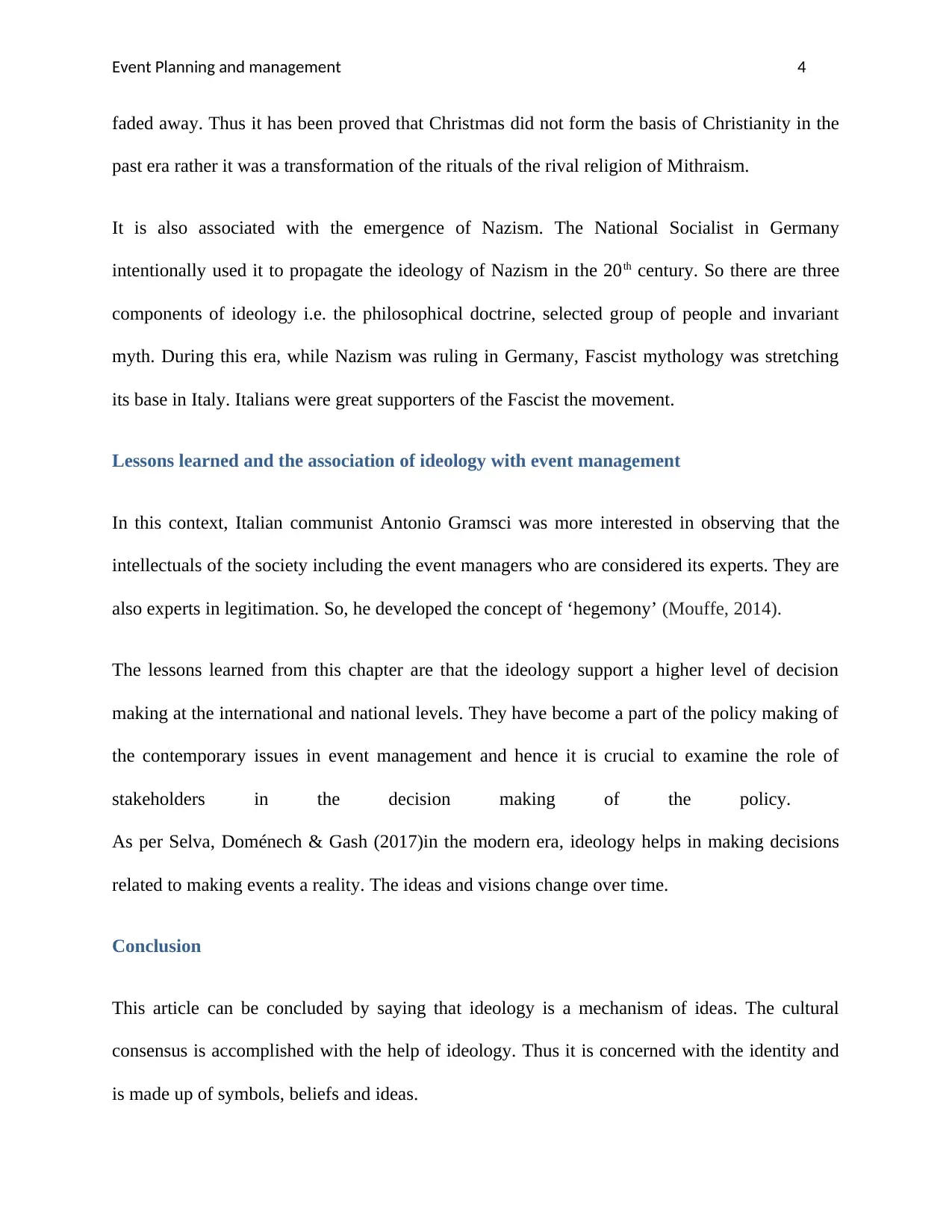
Event Planning and management 4
faded away. Thus it has been proved that Christmas did not form the basis of Christianity in the
past era rather it was a transformation of the rituals of the rival religion of Mithraism.
It is also associated with the emergence of Nazism. The National Socialist in Germany
intentionally used it to propagate the ideology of Nazism in the 20th century. So there are three
components of ideology i.e. the philosophical doctrine, selected group of people and invariant
myth. During this era, while Nazism was ruling in Germany, Fascist mythology was stretching
its base in Italy. Italians were great supporters of the Fascist the movement.
Lessons learned and the association of ideology with event management
In this context, Italian communist Antonio Gramsci was more interested in observing that the
intellectuals of the society including the event managers who are considered its experts. They are
also experts in legitimation. So, he developed the concept of ‘hegemony’ (Mouffe, 2014).
The lessons learned from this chapter are that the ideology support a higher level of decision
making at the international and national levels. They have become a part of the policy making of
the contemporary issues in event management and hence it is crucial to examine the role of
stakeholders in the decision making of the policy.
As per Selva, Doménech & Gash (2017)in the modern era, ideology helps in making decisions
related to making events a reality. The ideas and visions change over time.
Conclusion
This article can be concluded by saying that ideology is a mechanism of ideas. The cultural
consensus is accomplished with the help of ideology. Thus it is concerned with the identity and
is made up of symbols, beliefs and ideas.
faded away. Thus it has been proved that Christmas did not form the basis of Christianity in the
past era rather it was a transformation of the rituals of the rival religion of Mithraism.
It is also associated with the emergence of Nazism. The National Socialist in Germany
intentionally used it to propagate the ideology of Nazism in the 20th century. So there are three
components of ideology i.e. the philosophical doctrine, selected group of people and invariant
myth. During this era, while Nazism was ruling in Germany, Fascist mythology was stretching
its base in Italy. Italians were great supporters of the Fascist the movement.
Lessons learned and the association of ideology with event management
In this context, Italian communist Antonio Gramsci was more interested in observing that the
intellectuals of the society including the event managers who are considered its experts. They are
also experts in legitimation. So, he developed the concept of ‘hegemony’ (Mouffe, 2014).
The lessons learned from this chapter are that the ideology support a higher level of decision
making at the international and national levels. They have become a part of the policy making of
the contemporary issues in event management and hence it is crucial to examine the role of
stakeholders in the decision making of the policy.
As per Selva, Doménech & Gash (2017)in the modern era, ideology helps in making decisions
related to making events a reality. The ideas and visions change over time.
Conclusion
This article can be concluded by saying that ideology is a mechanism of ideas. The cultural
consensus is accomplished with the help of ideology. Thus it is concerned with the identity and
is made up of symbols, beliefs and ideas.
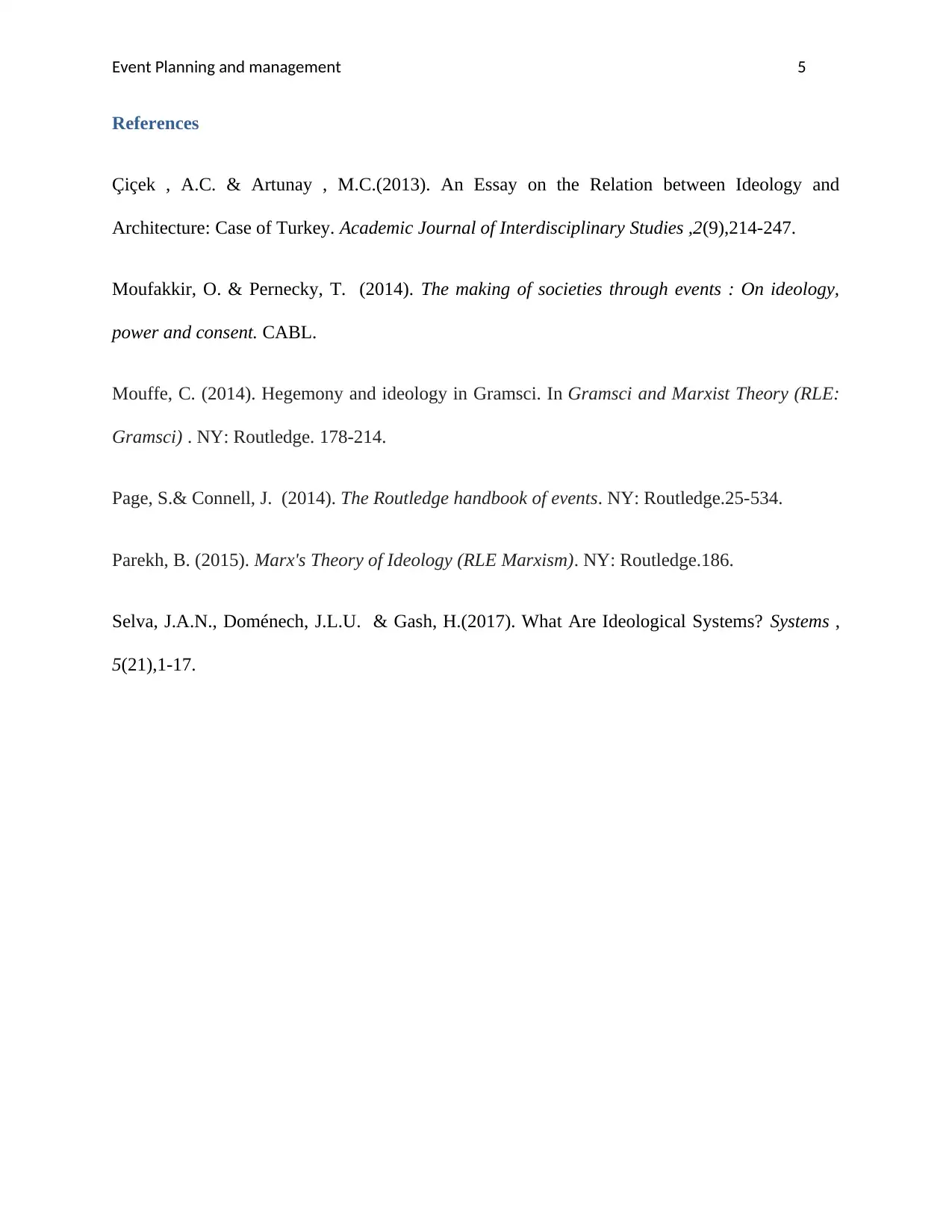
Event Planning and management 5
References
Çiçek , A.C. & Artunay , M.C.(2013). An Essay on the Relation between Ideology and
Architecture: Case of Turkey. Academic Journal of Interdisciplinary Studies ,2(9),214-247.
Moufakkir, O. & Pernecky, T. (2014). The making of societies through events : On ideology,
power and consent. CABL.
Mouffe, C. (2014). Hegemony and ideology in Gramsci. In Gramsci and Marxist Theory (RLE:
Gramsci) . NY: Routledge. 178-214.
Page, S.& Connell, J. (2014). The Routledge handbook of events. NY: Routledge.25-534.
Parekh, B. (2015). Marx's Theory of Ideology (RLE Marxism). NY: Routledge.186.
Selva, J.A.N., Doménech, J.L.U. & Gash, H.(2017). What Are Ideological Systems? Systems ,
5(21),1-17.
References
Çiçek , A.C. & Artunay , M.C.(2013). An Essay on the Relation between Ideology and
Architecture: Case of Turkey. Academic Journal of Interdisciplinary Studies ,2(9),214-247.
Moufakkir, O. & Pernecky, T. (2014). The making of societies through events : On ideology,
power and consent. CABL.
Mouffe, C. (2014). Hegemony and ideology in Gramsci. In Gramsci and Marxist Theory (RLE:
Gramsci) . NY: Routledge. 178-214.
Page, S.& Connell, J. (2014). The Routledge handbook of events. NY: Routledge.25-534.
Parekh, B. (2015). Marx's Theory of Ideology (RLE Marxism). NY: Routledge.186.
Selva, J.A.N., Doménech, J.L.U. & Gash, H.(2017). What Are Ideological Systems? Systems ,
5(21),1-17.
⊘ This is a preview!⊘
Do you want full access?
Subscribe today to unlock all pages.

Trusted by 1+ million students worldwide
1 out of 6
Related Documents
Your All-in-One AI-Powered Toolkit for Academic Success.
+13062052269
info@desklib.com
Available 24*7 on WhatsApp / Email
![[object Object]](/_next/static/media/star-bottom.7253800d.svg)
Unlock your academic potential
Copyright © 2020–2026 A2Z Services. All Rights Reserved. Developed and managed by ZUCOL.





